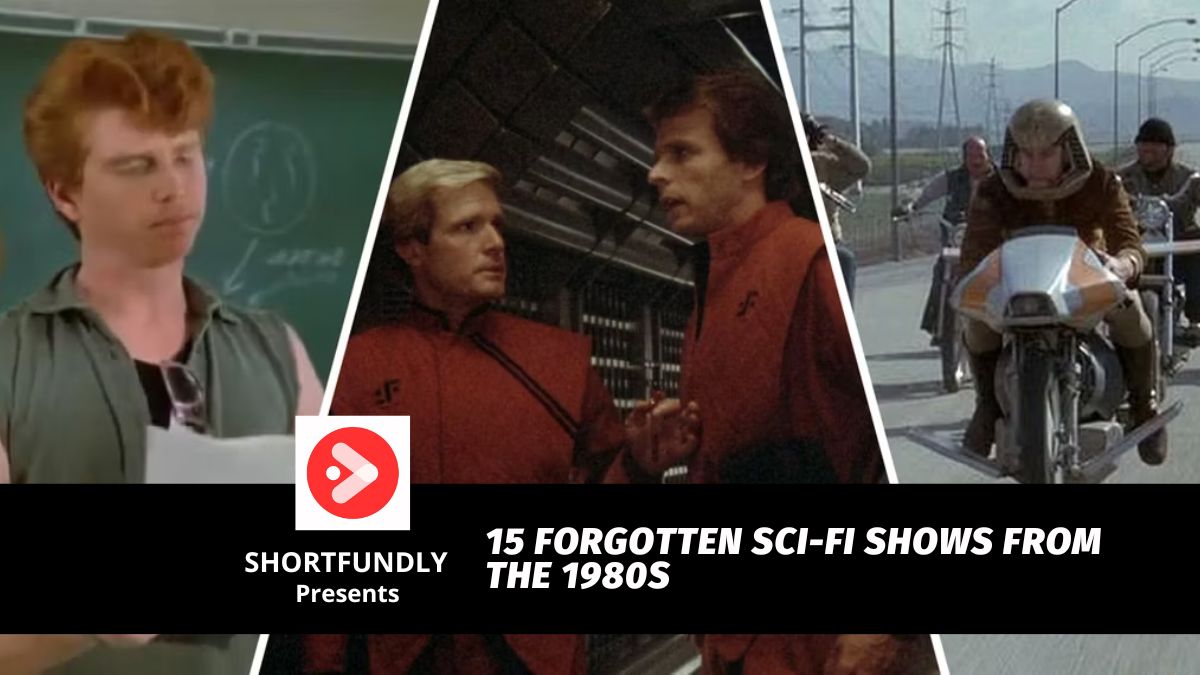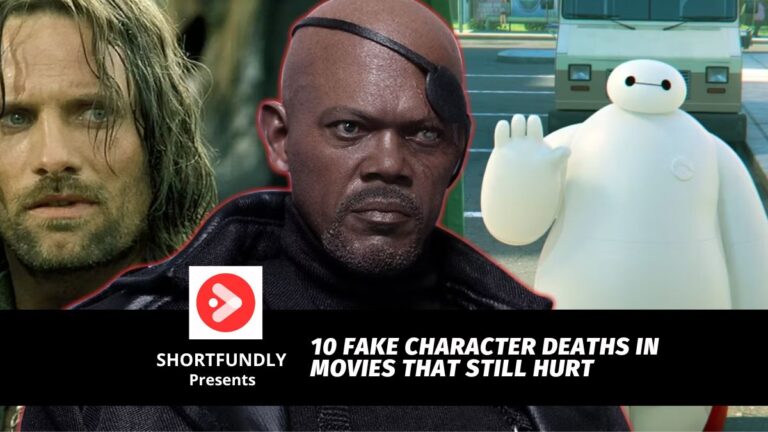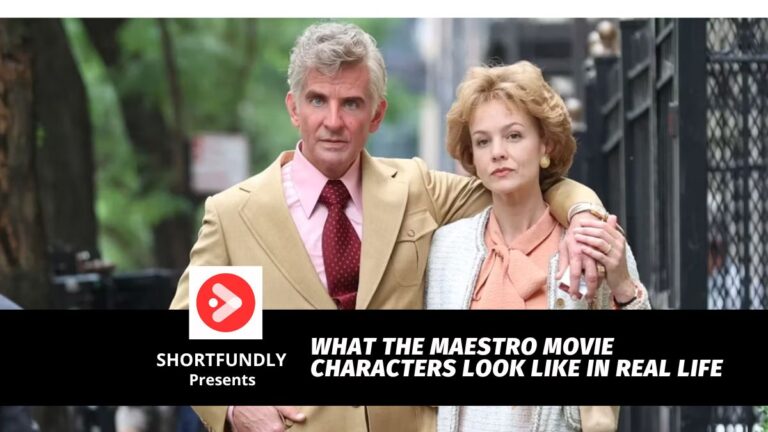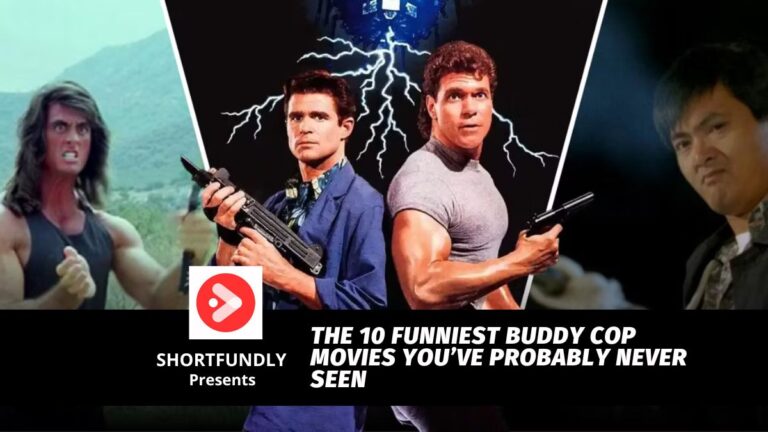Table of Contents
The 1980s witnessed a sci-fi movie boom with blockbusters like RoboCop, Aliens, Blade Runner, E.T., Star Wars, Back to the Future, and The Terminator, grossing massive amounts. Lesser-known films such as The Last Starfighter and Battle Beyond the Stars gained cult status over time.
Despite sitcom dominance on TV, a few sci-fi series like Star Trek: The Next Generation, Quantum Leap, The Transformers, and The Twilight Zone stood out. However, numerous intriguing shows from that era have been forgotten. Here are 15 of them, along with reasons for their obscurity and limited mentions in discussions.
Sponsered English Shortfilm Playlist
15 Forgotten Sci-Fi Shows From the 1980s
Amazing Stories (1985-1987)
Amazing Stories, a fantasy, sci-fi, and dramedy anthology series created by Steven Spielberg for NBC, enjoyed two seasons but faced an unsuccessful revival on Apple TV+ in 2020. The show, featuring diverse stories from a jock gaining a magnetic personality to a dying scientist merging with a machine, boasted notable directors like Spielberg, Clint Eastwood, Martin Scorsese, Danny DeVito, and Robert Zemeckis.
Despite occasional appearances by movie stars and winning five Emmy Awards, including Outstanding Cinematography and Sound Editing, Amazing Stories struggled to leave a lasting impact on ’80s pop culture. The series was deemed hit-or-miss, with very few memorable episodes. Even with Spielberg’s name attached, the show did not live up to expectations, as highlighted in a 1985 Washington Post article. The critique suggested that the Spielberg magic was not sufficient, with some episodes criticized for excessive sentimentality and a perceived return to Spielberg’s youthful and dewy-eyed themes one too many times.
Automan (1983-1984)
Created by Glen A. Larson for ABC, Automan, inspired by the visual aesthetics of Tron, features Desi Arnaz Jr. as Walter Nebicher and Chuck Wagner as Automan/Otto J. Mann. The plot revolves around a tech-savvy police officer who develops an artificially intelligent crime-fighting program and a holographic companion capable of materializing at night to apprehend criminals. Glen A. Larson, known for later producing Battlestar Galactica and the 2008 Knight Rider revival, couldn’t sustain Automan’s impact.
The series faced challenges with its Monday night time slot, competing against popular shows like Scarecrow and Mrs. King and TV’s Bloopers & Practical Jokes. Despite the captivating premise in an industry where AI and superheroes are perennial favorites, Automan only aired 12 of its 13 completed episodes due to poor ratings. Nevertheless, given the enduring popularity of AI and superhero themes, some argue that a reboot could breathe new life into the concept.
Galaxy High School (1986)
Galaxy High School, an animated series devised by Chris Columbus for CBS, follows the story of two Earth teenagers, Doyle Cleverlobe and Aimee Brightower, who attend an intergalactic school on the asteroid Flutor through an exchange program. Despite its promising concept and animation by TMS Entertainment, known for its work in both American and Japanese animation, such as Lupin the Third and Batman: The Animated Series, the show faced a short-lived run of only 13 episodes. Although Columbus had a script ready for a second season, CBS chose not to renew the contract. A potential movie adaptation with DreamWorks and Paramount Pictures in 1996 also fell through. While the series may be remembered for its catchy theme song and quirky alien characters by those who watched it in 1986 or its reruns in 1987, it failed to leave a lasting impact due to its premature cancellation and unsuccessful revival attempts.
The Powers of Matthew Star (1982-1983)
The Powers of Matthew Star aired on NBC’s Friday evening lineup and featured Peter Barton as Matthew Star, Amy Steel as his girlfriend Pam Elliot, and Louis Gossett Jr. as his guardian, Walt “D’Hai” Shepherd. The series followed Matthew, an undercover alien prince escaping assassins from the fallen planet Quadris, who uses his super abilities to fight local crime after enrolling in Crestridge High School. Created by Steven E. de Souza, known for later writing Die Hard films and Judge Dredd, the show’s impact was short-lived. Despite a strong start, it faced criticism for inconsistent writing, plot holes, and bland acting. The decision to shift from a relatable high-school setting to darker, nationwide governmental missions halfway through confused teen viewers. Unfortunately, these factors contributed to the show’s cancellation after just one season.
Alien Nation (1989-1990)
Based on the 1988 film by Graham Baker, Alien Nation, a neo-noir sci-fi procedural series, aired on Fox for 22 episodes. The main cast included James Caan as Matthew Sykes, Mandy Patinkin as Sam Francisco, and Terence Stamp as William Harcourt. The narrative, set in the near future, revolves around two cops – one human and one alien – tackling crime, prejudice, and the integration of aliens in Los Angeles.
Unfortunately, the show faced a premature cancellation after just one season, primarily due to the network’s low advertising revenue. Despite viewers anticipating a second season, the finale concluded with a significant cliffhanger. Although five television movies directed by Kenneth Johnson continued the story in the 1990s, none achieved the relative success of the original Baker film. A potential SyFy revival in 2014 was abandoned in favor of paranormal reality shows.
Something Is Out There (1988)
Something Is Out There, a miniseries developed by Frank Lupo, aired on NBC and featured Joe Cortese as Jack Breslin, Maryam d’Abo as Ta’Ra, and George Dzundza as Frank Dileo. The storyline revolved around brutal murders committed by an alien who escaped from an interstellar prison ship. Despite the compelling premise and positive reception of the chemistry between Jack and Ta’Ra, the show faced tough competition from popular CBS series like Dallas and Beauty and the Beast. Unfortunately, it was canceled after airing only six out of its nine episodes, preventing it from leaving a lasting impact.
Queen Millennia (1981-1982)
Queen Millennia, created by Japanese animator Leiji Matsumoto and animated by Toei, aired on Fuji TV. The plot centers around the impending collision of the planet La-Metal with Earth every 1,000 years. To combat an ice age, Queen Larela plans to abduct humans, mechanize them into slaves, and has an immortal operative named Yukino Yayoi on Earth since a millennium ago.
Despite an initial plan of 52 episodes, the series only aired 42 due to lower ratings compared to its predecessor, Galaxy Express 999. Additionally, it did not have a standalone broadcast in the U.S., with some scenes hastily combined with the more popular LeijiVerse show, Space Pirate Captain Harlock. This contributed to the limited lasting impact of Queen Millennia.
Get your short films reviewed by Shortfundly‘s creative expert team. Click here to submit your short films now.
The Adventures of the Galaxy Rangers (1986-1989)
The Adventures of the Galaxy Rangers, an American series blending sci-fi and Western elements, was created by Robert Mandell but animated in Japan. Set in 2086, the show revolves around two peaceful aliens who sought Earth’s help, providing plans for a hyperdrive in return. This breakthrough allowed humanity to explore the stars, and a team of unique individuals was assembled to protect Earth and its allies.
Despite its progressive subplots, well-defined characters, and distinctive humor, the series failed to achieve lasting impact. Its modest cult following can be attributed to the fact that, unlike other animated shows of its time, it didn’t heavily focus on toy merchandising, lack video game tie-ins, or air on a major network.
Galactica 1980 (1980)
After the cancellation of the original Battlestar Galactica in 1979, ABC sought a more budget-friendly replacement and approached Glen A. Larson, resulting in the creation of Galactica 1980. Set in the same universe but many years later, the series depicted the fugitive Galactica fleet’s attempts to adapt their technology to Earth’s while defending against the Cylon threat.
Despite receiving a nomination for Best Costume Design, Galactica 1980 failed to leave a lasting impact. It ran for only 10 episodes and faced criticism from both reviewers and the audience. Many considered it a poorly conceived and cheaper continuation of its predecessor. According to Alterpast, the show seemed to employ uninspired writers, leading to episodes with clichéd and moronic plots. Elements like the unimpressive flying motorcycles, super scouts, and poorly executed time travel were cited as lacking imagination and contributed to the show’s overall disappointment.
Once Upon a Time… Space (1982)
Once known as Galaxy Patrol PJ and helmed by director Albert Barillé, Once Upon a Time… Space is a French animated sci-fi series produced by Eiken Studios in Japan. While it incorporates characters from the educational series Once Upon a Time… Man, the narrative takes on a galactic power-struggle setting.
Despite being aired in Japan, France, Germany, South Africa, and even on the U.S. History Channel, the series consisted of only 26 episodes and was exclusively available on home media in French during its initial release. Unfortunately, the Japanese dubbed version is now considered missing.
The Phoenix (1981-1982)
Judson Scott played the character Bennu of the Golden Light in “The Phoenix,” an ancient alien possessing levitation, astral projection, and telepathic powers, awakened in 20th-century Peru. The show’s impact was short-lived, lasting only five out of eight episodes on ABC within a month. Despite being well-researched and intriguing, it failed to make a commercial impact in its genre, possibly due to being ahead of its time.
Starman (1986–1987)
Taking place 15 years after John Carpenter’s 1984 film, Starman stars Robert Hays as Paul Forrester, an alien clone of a deceased photojournalist. Returning to Earth, Paul assists his 14-year-old son Scott (played by Christopher Daniel Barnes) in searching for the boy’s missing mother. Despite its connection to Carpenter’s movie, the series lacked direct involvement from Carpenter himself.
However, Starman’s impact was short-lived. The show aired on ABC for just one season and garnered mixed reviews. Critics characterized it as ranging from “a pleasant dose of the fantastic” to being “confusing,” “grating and pedestrian,” and even a total “drag.” These factors contributed to the series’ limited and ultimately fading influence.
Jayce and the Wheeled Warriors (1985)
Jayce and the Wheeled Warriors, produced by multiple Japanese studios, comprised 65 half-hour episodes. The show is set in a galaxy where magic and technology coexist, depicting the battle between the Lightning League and the Monster Minds, a hostile race of mutated plant creatures led by Sawboss. Created by J. Michael Straczynski after leaving Filmation in the mid-1980s, the series initially aired in French on TF1 before reaching the U.S. Unfortunately, it concluded on a cliffhanger, and the associated action figures and toys failed to generate substantial profit, leading to the cancellation of the planned movie sequel.
Arcadia of My Youth: Endless Orbit SSX (1982-1983)
Arcadia of My Youth: Endless Orbit SSX is a sequel to the 1982 animated film, continuing the story of the honorable space pirate Harlock and his eclectic crew as they battle the hostile Illumidas aliens. Leiji Matsumoto’s signature emphasis on drama over calculated science-fiction is evident, a characteristic found in many of his works.
The central characters, including Harlock, Tochiro, and Emeraldas, play pivotal roles in the narrative. Matsumoto’s Leijiverse features an interconnected manga and animation universe, with these characters being iconic within it.
However, the impact of Arcadia of My Youth: Endless Orbit SSX didn’t endure as expected. Some viewers were deterred by the erratic continuity in the Leijiverse and the frequent crossovers between shows and movies, finding it confusing. The series also faced challenges, as it aired just before the Gundam phenomenon took off, making it difficult to gain traction. Ultimately, the show was canceled after 22 episodes. Despite these factors, it remains a hidden gem appreciated by a select few today.
V: The Series (1984-1985)
Kenneth Johnson, the creator of the well-known Incredible Hulk series, brought forth V: The Series, featuring Mark Singer, Michael Ironside, June Chadwick, and Faye Grant. The show revolves around the battle against humanoid lizard-like aliens and a human industrialist making a deal with their leader. Despite the initial success of the miniseries and a short-lived sequel, V: The Last Battle, the series failed to leave a lasting impact. Some critics labeled it as “messy” and “solid camp.” Despite plans for a sequel, V: The Next Chapter, poor Nielsen ratings led Warner Bros. to abandon the project. A 2009-2011 remake with Elizabeth Mitchell and Morena Baccarin was also canceled after two seasons.
Note:
*Shortfundly is hiring for multiple roles in Chennai. Start referring your known connections to these openings*. Check it out – https://lnkd.in/erZm6rzh
About Shortfundly
Shortfundly is an OTT marketplace platform available to share the best short films and web series through global multi-platform network. Their editorial platform enables global audience to easily discover, watch, and share unique contents anywhere on their desktop, connected TV and mobile devices.
If you are planning to release and earn on an OTT platform, learn how to distribute your short film via Shortfundly.
For publishing an advertorial article about your digital news/product launch/ short film/web series/album song on our website, drop an email at [email protected]
Hey Cinephiles! We welcome guest blogging on our platform. Do share your article with us.
Check out our Shortfundly YouTube channel for other interesting podcasts & interviews with filmmakers.
To watch unlimited premium short films & web series, Download the Shortfundly mobile application now available on Google Play Store and Apple App store.






